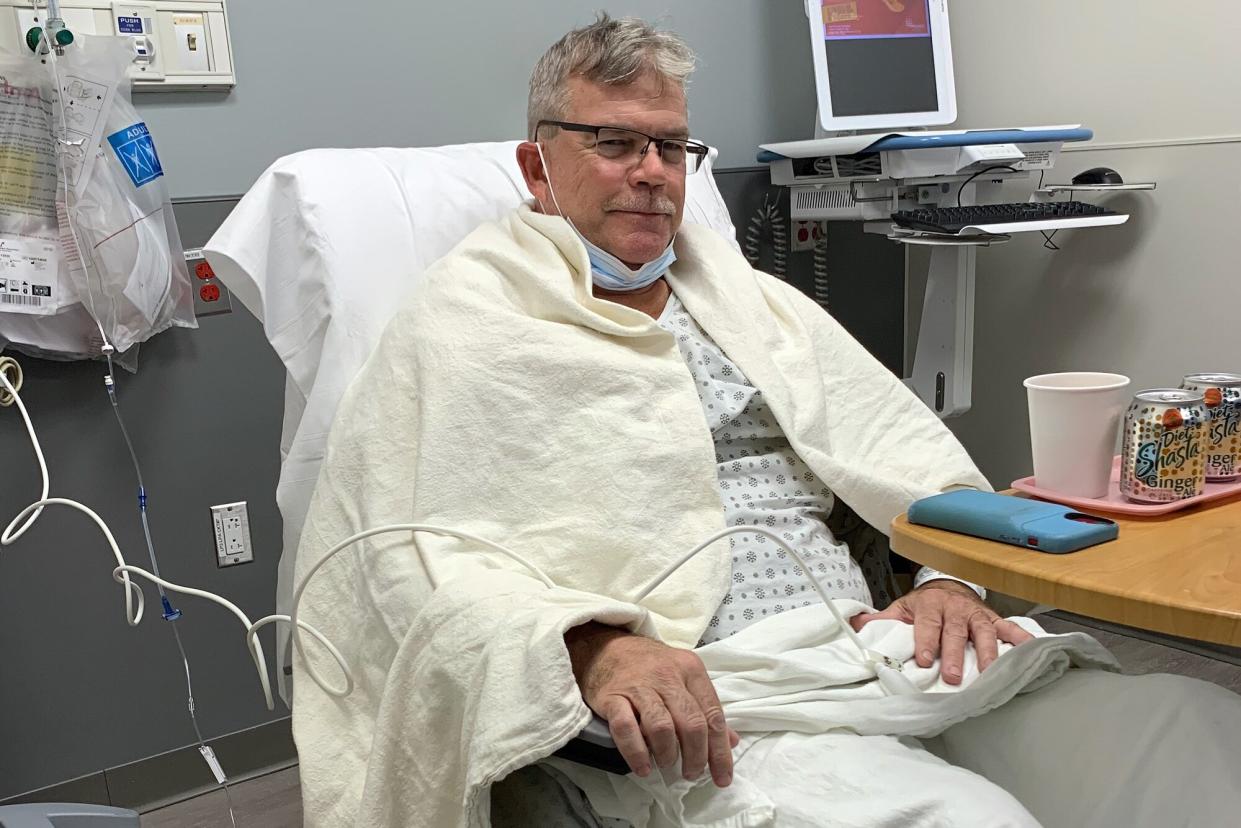Ironman Triathlete Shares His Diagnosis of Male Breast Cancer: 'This Is a 1% Club that No One Wants to Join'

Courtesy Rich Donnelly
This is a 1 percent club no one wants to join: men with breast cancer.
On Sept. 27, still recovering from back surgery for a herniated disc two months earlier, I was icing my back on a yoga mat on the living room floor when I noticed a bump near my left nipple.
I asked my wife Jean to see what she thought. She knows breast cancer — Jean's been clean for 28 years. She didn't like what she felt.
The next morning, I called Jean's doctor, Paul Baron, chief of breast surgery at Lenox Hill/Northwell in New York, and got an appointment two days later. The ultrasound showed a suspicious mass.
Next step was a mammogram followed by a more-sophisticated ultrasound. In both waiting areas, I was the enigma. The women waiting for their tests clutched their robes round them and whispered, "There's a man in here."
When both those tests also came back with the detection of a suspicious mass, it was on to a needle biopsy. That came a few days later.
RELATED: Mathew Knowles — Dad to Beyoncé and Solange — Wants to Save Lives After Surviving Breast Cancer
The doctor that performed the test said I should definitely see a surgeon to address the issue quickly. She didn't think it had spread into any of the surrounding lymph nodes, but that of course remained to be seen.
By the time I saw Dr. Baron, the results had confirmed that the mass was malignant — it was 2.5 centimeters, an invasive ductal carcinoma that was stage one/two. I didn't even know men had milk ducts.
My surgery was set up for around a week later. The day before, I had to go to the hospital's nuclear medicine lab to get a radioactive dye injected into my left breast so that when Dr. Baron performed the procedure the next morning, he knew which lymph node to remove to check whether the cancer had started to spread.
Following a lumpectomy and the removal of my left nipple as well as the closest lymph node, a drain was inserted that I have to wear for a week—and empty twice daily—to do the work of the now-removed lymph node.
RELATED: Katie Couric 'Feeling Great' After Two Weeks of Radiation Treatment for Breast Cancer
The doctor said he believes the node may have been positive for cancer cells, but didn't believe that chemotherapy would be necessary. Instead, I'm most likely facing 3 ½ weeks of daily radiation. We're still waiting for the pathology to finalize the course of action but he thinks I'll have to take Tamoxifen, an estrogen blocker, for the next several years. I'll also have to be monitored the rest of my life with annual mammograms and whatever other tests the doctors deem necessary.
In the three weeks since the diagnosis, I've experienced a roller coaster of emotions: fear, anger, gratitude for life and an urgency to fill my days with all the things I still want to do. When Jean and I married in 1999, our wedding song was Aerosmith's "Don't Want to Miss a Thing." In the years since, we've jam-packed our life with adventures: European ski trips, bike tours to exotic locales, golf vacations, countless triathlons and other active pursuits. As Jean says: She's not through with me yet, there's still a lot more on our to-do wish list.
Staying positive is not easy, especially during this period when I'm waiting for the pathology results. But Jean's experience — nearly three decades without a recurrence — and the stats on survivorship provide comfort.
Of course, the figures among men are much more sobering: The American Cancer Society estimates that of the 2,710 new cases of invasive breast cancer diagnosed each year about 530 men will die. That's a group I don't plan to join since I'm one of the lucky ones who discovered it early.
In a recent survey, 22 percent of American men said they had no idea they could develop breast cancer. I'm living proof that they can.

Courtesy Rich Donnelly
I've been an athlete my entire life — played football, baseball, skiing, golf. I took up triathlons in 1994, a year after my first marathon, and have participated in the Ironman every year since 1999.
Dr. Baron said he'd get me to the start line of my 27th Ironman triathlon on July 23, in Lake Placid, N.Y. I'll make it to the finish.

 Yahoo News
Yahoo News 
